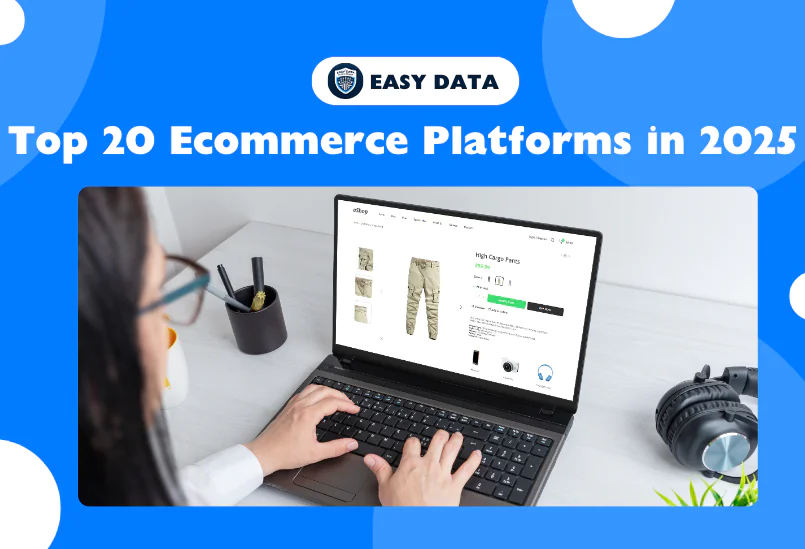In today’s digital-first world, ecommerce platforms have become essential tools for small businesses aiming to thrive in a competitive market. With a variety of options available, it can be challenging to choose the right platform that aligns with your business needs. In this article, we’ll explore the top 20 ecommerce platforms examples for small businesses in 2025, highlighting their unique features, advantages, and potential drawbacks.
For more insights on ecommerce trends and data-driven solutions, visit Easy Data.

1. Shopify
Shopify remains a popular choice among small businesses due to its user-friendly interface and extensive app store. It’s perfect for entrepreneurs who want a quick setup and scalability.
Key Features:
- Easy-to-use drag-and-drop store builder
- Extensive theme customization
- Over 6,000 apps for extended functionality
Best For:
Small businesses looking for simplicity and scalability.
2. WooCommerce
As a WordPress plugin, WooCommerce transforms your website into a fully functional online store. It’s ideal for those already familiar with WordPress.
Key Features:
- Open-source and highly customizable
- Large community support
- Seamless integration with WordPress plugins
Best For:
Businesses with existing WordPress sites.
3. BigCommerce
BigCommerce offers robust features suitable for growing small businesses. Its built-in tools eliminate the need for additional plugins.
Key Features:
- No transaction fees
- Built-in SEO tools
- Multi-channel selling capabilities
Best For:
Businesses planning for rapid growth.
4. Squarespace
Known for its stunning templates, Squarespace is a favorite for creative businesses looking to showcase their products beautifully.
Key Features:
- Award-winning design templates
- Built-in marketing tools
- Integrated analytics
Best For:
Creative entrepreneurs such as artists and designers.
5. Wix eCommerce
Wix’s ecommerce solutions cater to small businesses seeking an intuitive platform with design flexibility.
Key Features:
- Drag-and-drop editor
- Automated tax calculations
- Extensive app market
Best For:
Businesses that prioritize design and ease of use.
6. Magento (Adobe Commerce)
Magento is a powerful, open-source platform ideal for tech-savvy business owners who want complete control over their store.
Key Features:
- Advanced customization options
- Scalability for growing businesses
- Strong community and developer support
Best For:
Businesses with complex needs and a dedicated development team.
7. Etsy
Etsy isn’t a standalone ecommerce platform but a marketplace that empowers small artisans and crafters to reach a global audience.
Key Features:
- Built-in audience of millions
- Simple setup process
- Low upfront costs
Best For:
Handmade and vintage product sellers.
8. Ecwid
Ecwid allows you to add an online store to your existing website or social media pages, making it a flexible option for small businesses.
Key Features:
- Multi-channel selling
- Easy integration with existing websites
- Affordable pricing tiers
Best For:
Businesses looking to expand their current digital presence.
9. Weebly
Weebly is a straightforward platform designed for small businesses and beginners who need a simple online store.
Key Features:
- Drag-and-drop website builder
- Affordable pricing
- Integrated marketing tools
Best For:
Startups and micro businesses.
10. PrestaShop
PrestaShop is an open-source ecommerce platform that offers complete control over your store’s functionality and design.
Key Features:
- No subscription fees
- Multilingual support
- Extensive customization options
Best For:
Small businesses with international customers.
11. Zyro
Zyro is an emerging platform offering simplicity and affordability for small businesses just starting their ecommerce journey.
Key Features:
- AI-driven tools for design and content
- Low-cost plans
- Mobile-friendly templates
Best For:
Budget-conscious entrepreneurs.
12. Volusion
Volusion specializes in providing tools for small businesses to manage products, orders, and customers efficiently.
Key Features:
- Inventory management tools
- Built-in CRM
- SEO-friendly structure
Best For:
Product-heavy businesses.
13. Shift4Shop
Previously known as 3dcart, Shift4Shop is a feature-rich platform with competitive pricing for small businesses.
Key Features:
- Unlimited product listings
- Free SSL certificate
- Abandoned cart recovery
Best For:
Small businesses looking for robust features at no cost.
14. OpenCart
OpenCart is another open-source platform providing flexibility for businesses that want to control every aspect of their store.
Key Features:
- Multi-store management
- No subscription fees
- Large library of extensions
Best For:
Tech-savvy entrepreneurs.
15. Amazon
Amazon’s marketplace is a powerful option for small businesses seeking exposure to millions of potential customers.
Key Features:
- Global customer base
- Fulfillment by Amazon (FBA)
- Trust and credibility
Best For:
Small businesses selling consumer goods.
16. Gumroad
Gumroad is a straightforward platform for creators and digital product sellers to monetize their offerings.
Key Features:
- Easy digital product delivery
- Simple checkout process
- Low transaction fees
Best For:
Digital content creators.
17. Sellfy
Sellfy offers an all-in-one platform for selling physical and digital products, subscriptions, and print-on-demand items.
Key Features:
- Subscription selling options
- Built-in marketing tools
- Print-on-demand functionality
Best For:
Creators with diverse product types.
18. Spocket
Spocket focuses on dropshipping, providing access to vetted suppliers and high-quality products.
Key Features:
- Large supplier network
- Automated inventory updates
- Fast shipping options
Best For:
Dropshipping businesses.
19. Square Online
Square Online is an affordable solution for businesses already using Square’s POS system, offering seamless integration.
Key Features:
- Free plan available
- Syncs with Square POS
- Easy-to-use interface
Best For:
Brick-and-mortar stores expanding online.
20. Gumtree
Gumtree is a classified ads platform that allows small businesses to showcase products locally or globally.
Key Features:
- Low listing fees
- Local market focus
- High user engagement
Best For:
Local product and service sellers.
FAQs
1. What is the best ecommerce platform for beginners? Shopify and Wix are great options for beginners due to their intuitive interfaces and helpful resources.
2. Which platform is best for international sales? PrestaShop and WooCommerce offer multilingual support, making them ideal for businesses targeting global markets.
3. Are there free ecommerce platforms? Yes, platforms like Shift4Shop and OpenCart offer free versions, though additional costs may apply for hosting and extensions.
Conclusion
Choosing the right ecommerce platform can make or break your small business’s success in 2025. From user-friendly solutions like Shopify and Wix to specialized options like Etsy and Spocket, the right choice depends on your business’s specific needs and goals. Explore these ecommerce platforms examples and find the one that aligns with your vision for growth and profitability. For tailored ecommerce data insights, visit Easy Data.


Leave a Reply